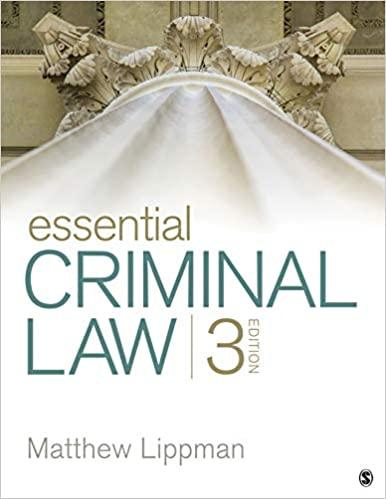Question
15. Distinguish the difference between law and ethics. List all of the ethical dilemmas Michael faced in this scenario? SOURCES MICHAEL Michael Jackson was hired
15. Distinguish the difference between law and ethics. List all of the ethical dilemmas Michael faced in this scenario?
SOURCES
MICHAEL
Michael Jackson was hired in January as the new Operations Manager for "Just Collect It, Inc", a Texas toy assembly plant also known as JCI. As the Operations Manager Michael's duties included contract negotiations, accounts receivables & payables, Human Resources & scheduling, shipping & receiving and purchasing. Michael recognized that the duties agreed upon were customarily performed by 3-5 people, and or 3-5 departments, but due to budget concerns JCI was convinced that the right Operations Manager would be effective in all of the assigned tasks. Michael was aware that the 5 previous Operations Managers were overwhelmed with the job duties and resigned within 6 months of being hired. Michael was informed upon hiring that JCI did not have a Contracts, Account Receivable, HR, Shipping and or Purchasing department or positions because of budget restrictions and they had 2 absolutely no intention of filing the positions. Michael was convinced that he had the solution to succeed at each duty. As operations manager Michael would receive an annual salary of $250,000. Michael realized that he truly needed 4 senior type positions, which required experience and education, to assist him to assist him to success. The collective salary for all 4 of the positions needed would be over $250,000. He knew the company would not budget for the additional help so he had to make an alternative solution to succeed. Once Michael took over the leadership role, while being fully aware of the corporation's decision not to hire any additional labor, he made the executive decision to hire 4 inexperienced recent high school graduates to handle some of the task that was assigned to him. Michael had success in the past hiring "fresh minds" as he calls it. He enjoyed training young employees in the methods he preferred them to use. Hence, he hired Carl to handle the contracting, Alice for general accounting and Accounts receivable, Harry for HR demands and scheduling and Paula for purchasing. Michael retained all the other duties and felt his time would be best spent keeping a close eye on the new hires and overseeing the assembly workers. To offset budget concerns Michael used $72,000.00 of his $250,00000 and paid the new hires directly from his personal account. Their employment setup provided for pay only, they did not receive any health, retirement, 401K or workman compensation. They did not have any federal or social security withholdings. They were scheduled to receive their full hourly rate without deduction every Friday. Each employee would receive $18,000.00 annually in pay. The experienced professional would have commanded $62,500.00 for the position.
Michael was notified by the Executive assistant of JCI's president that a scandal about the company would break in the news in days to come. She said that the scandal would negatively impact stock value of JCI. In fact, Michael was informed that all of the top executives were cashing in their stock so as not to lose the life's savings. One of the top executives suggested strongly that Michael sell his stock while it still had value. Michael gave it some thought for a few days and told his broker to "sell it all". He recognized a handsome profit. After cashing in his stock he admitted that he would not have cashed it in if it were not for the executives giving him the warning and basically insisting that he sell. The day after the sale of Michael's stock the value of JCI dropped more than 75%. Most of their investors lost 100% of their investments. Michael's broker inadvertently sold 75% of his stock instead of the entire 100% that Michael requested. Michael knew a wealthy older woman who had no knowledge of the devalued stock and offered to sell her his shares at a bargain price of $100 per share the next day. The stock 4 had already nose-dived and the stock that he was selling to the woman had no actual value at all. She purchased 1250 shares at a rate of $100 a share for total of $125,000.00. The woman asked him 3 times if the sock was profitable stock and he assured her it was. Five days after Michael sold his stock, the SEC visited him at JCI. The SEC took Michael into the back office for an interrogation. Michael insisted that he want to call his lawyer buy the Federal Officers just continued their questioning. After refusing to answer any questions they took him to lead him to the police car and took him to the county jail. At no time did they read him is Maranda rights. Upon arrival at the station they continue to refuse Michael's request to call his attorney. Additionally, he was not specifically told what he was being charged with and he was held in a holding cell for 80 days. His holding cell did not heat and temperatures fell to as low as 10 below zero in the cell he was kept in. On the 81 first day Michael was taken before a judge and gave his plea of Nolo Contendere.
Step by Step Solution
There are 3 Steps involved in it
Step: 1

Get Instant Access to Expert-Tailored Solutions
See step-by-step solutions with expert insights and AI powered tools for academic success
Step: 2

Step: 3

Ace Your Homework with AI
Get the answers you need in no time with our AI-driven, step-by-step assistance
Get Started


